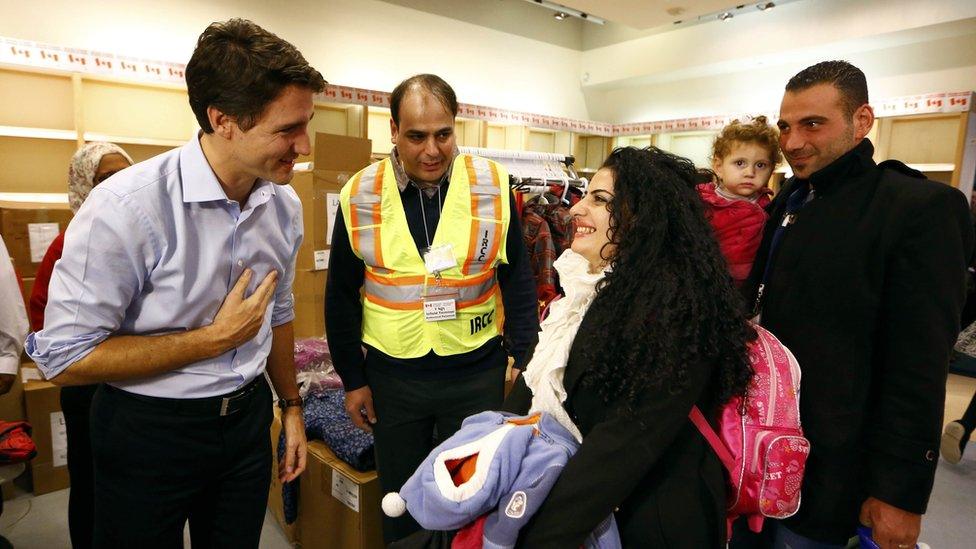The Canadian businessman who sponsored 200 refugees
- Published
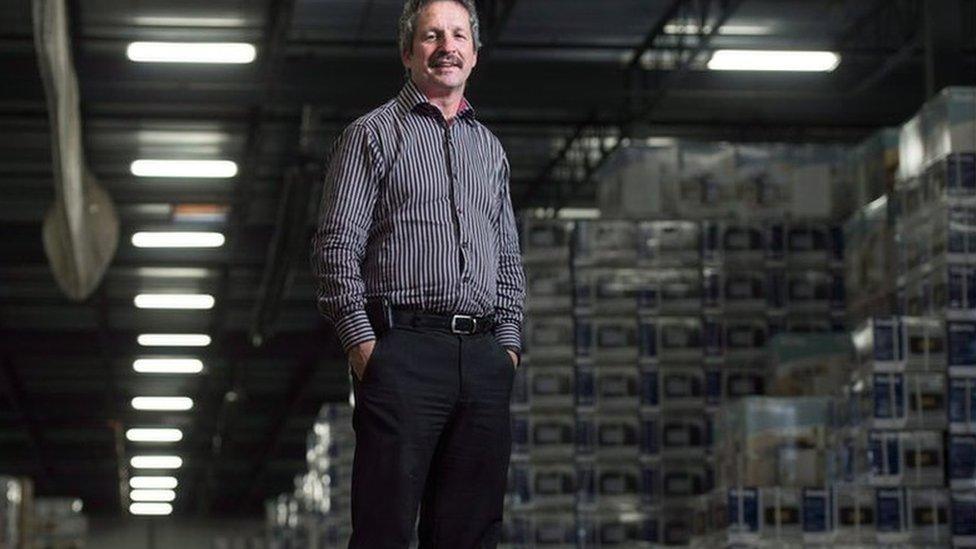
Danby CEO Jim Estill put up $1.5m of his own money to bring 58 Syrian families to Canada
One Canadian businessman decided he could do more for desperate Syrians fleeing their war-torn country. So he bankrolled an Ontario town's resettlement of over 200 refugees.
Jim Estill was growing frustrated.
Over the summer of 2015, the business executive from the southwestern Ontario town of Guelph watched the Syrian refugee crisis unfold a half a world away, night after night on the evening news.
"I didn't think people were doing enough things fast enough," he says.
So Estill, chief executive of home appliance company Danby, devised a plan.
He would put up CA$1.5m (US$1.1m/£910,000) of his own money to bring over 50 refugee families to Canada, and co-ordinate a community-wide effort to help settle them into their new life.
It would be a volunteer-driven project, but organised like a business. Volunteer directors led multiple teams, each in charge of a different aspect of settling newcomers.
Canada allows private citizens, along with authorised sponsorship groups, to directly sponsor refugees by providing newcomers with basic material needs like food, clothing, housing, and support integrating into Canadian society. But Estill was looking to make a big impact, quickly.
"I know how to scale things," says Estill, who made his fortune as an entrepreneur, and previously worked as a director at Research in Motion, best known for producing the BlackBerry mobile phone.
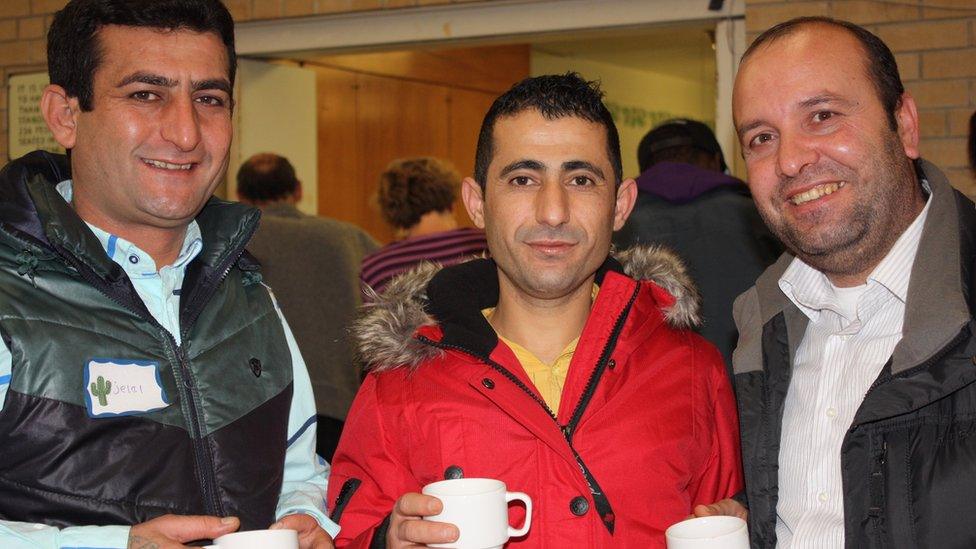
Jelil Alou, a Syrian refugee sponsored by the Canadian government, stands with Muhamad Abdo and Ibrahim Halil Dudu, who were sponsored by Jim Estill and the Muslim Society of Guelph
Estill would be the money man, but he needed partners.
So he brought together 10 different faith-based organisations that were already looking at ways to help those affected by the Syrian civil war.
Sara Sayyed remembers the night her husband, president of the Muslim Society of Guelph, came back from that meeting and told her about Estill's plan.
"I was completely floored. I said: 'Let's get involved in this.'"
In November 2015, the local Guelph paper published an article about the plan. It was translated into Arabic and spread around the Middle East.
"People started emailing us directly from Turkey, from Lebanon, from within Syria, saying: 'Can you help us? Can you do something?'" says Sayyed.
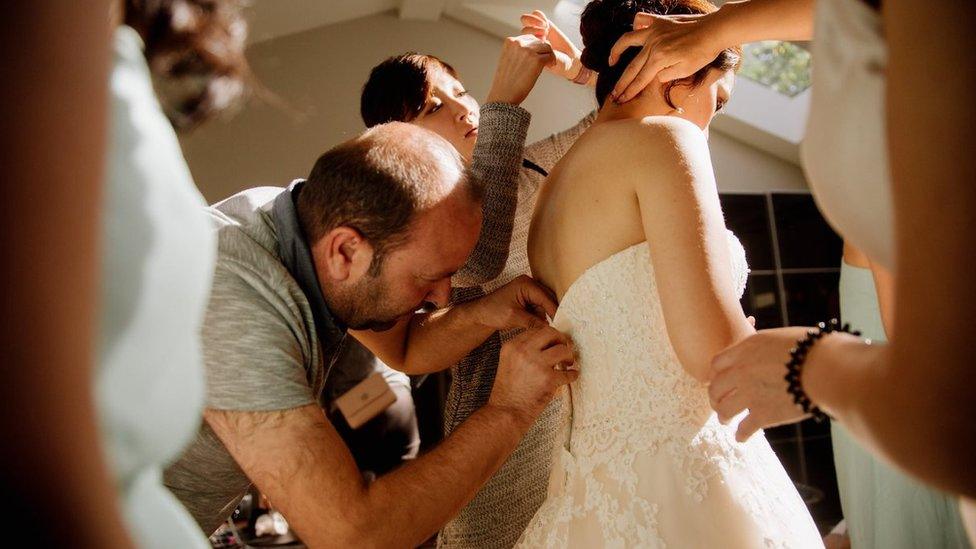
Ibrahim Halil Dudu, who was sponsored by Jim Estill and the Muslim Society of Guelph, made international headlines when his skills as a tailor were called on to save a bride's wedding day
As Estill recalls it: "At first you get one email. You get one or two and say: 'Let's see what I can do.' Then it turns into a hundred. And then it's very difficult."
Sayyed's dining room table disappeared under a pile of sponsorship applications. Fifty-eight families were eventually selected.
But that was just the first challenge.
The sponsored families arrived at a trickle. Long delays in government processing came at a cost. Hard to find housing sat vacant. Donations languished in warehouses.
"I was completely taken by surprise it would take so long for the Canadian government to let people in," says Estill. "That cost us a lot."
By December 2016, 47 of 58 families had arrived in Guelph.
But Estill realised that many newcomers were having difficulty finding work because they lacked experience or English language skills.
So he launched a program that provides Syrian refugees with jobs at Danby, along with regular English lessons. He has also assisted others in establishing their own business.
Daad reflects on her previous life in a Syrian war zone
"I don't want to bring people in and put them on welfare," he says, adding if that happens, "I've failed."
Sayyed says that Estill does not come across as a typical big business executive.
"You think: CEO of a company, this image based on what you see on TV and stuff right? And he is the most down to earth guy dressed in regular jeans and a shirt driving a really old car, nothing fancy or flashy about him," she says.
She sees no reason other business people cannot copy his effort.
"The biggest thing is just to have that financial backing. If more people from our business communities just stepped forward and said: 'We'll do this,' it can be done."
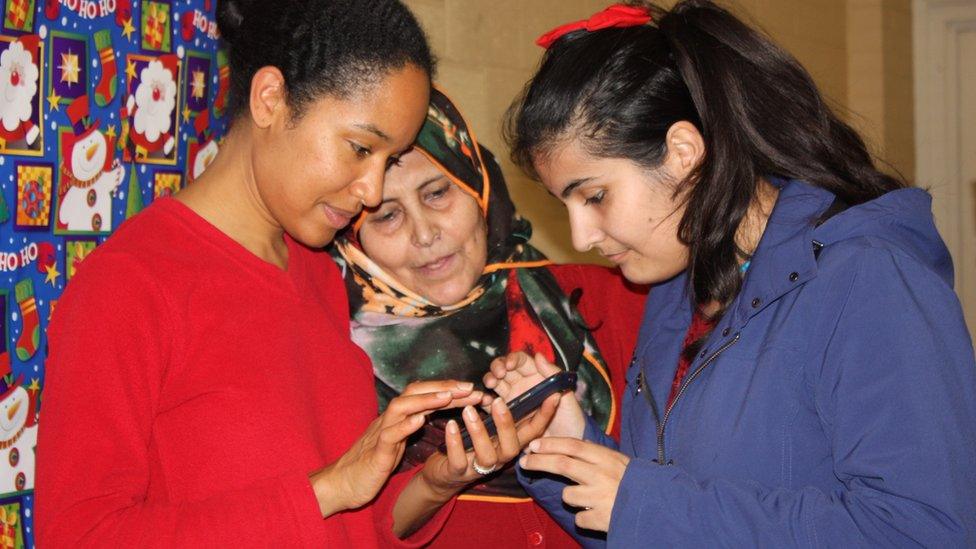
Jaya James (left) with Gaziye Fettah and Rojin Haci, who were sponsored by Jim Estill and the Muslim Society of Guelph
Jaya James, who worked worked closely with Sayyed and Estill, took a six-month leave from her job as a civil servant to work as a full-time volunteer director of the Guelph Refugee Sponsorship Forum.
Estill contributed the big vision and the contacts, she says, while she and Sayyed took care of the details. They screened, trained and mentored 800 volunteers, co-ordinated the organisations involved in the effort, and tackled emergencies, including fielding late night calls about bug-infested donated furniture.
James says Estill, who she describes as "a little bristly" but "with a really big heart", has challenged people to ask: "What can I give? What can I do?"
Estill says he reads and replies to all the emails he receives from people seeking to come to Canada and is looking to sponsor more, though the focus will be on bringing in relatives of the newcomers who have already arrived.
Still, the businessman remains perplexed by the praise the effort has gotten worldwide. Estill says he simply had the means to help and a vision of how to implement the plan.
And he says his parents, who sponsored two Ugandan refugees when he was a child, instilled humanitarian values in him.
"I guess I was raised right. That's what I tell my mom," he says with a laugh.
- Published29 September 2016
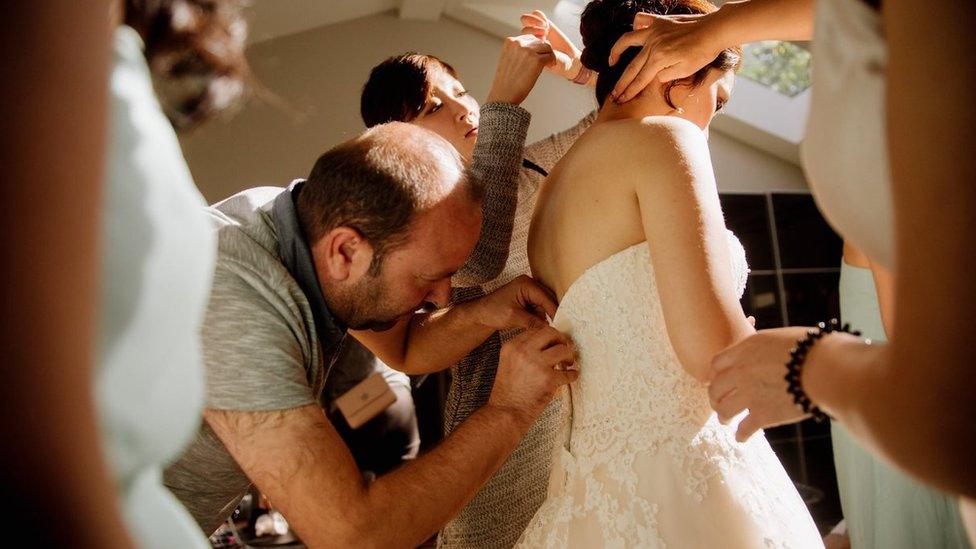
- Published11 December 2015
